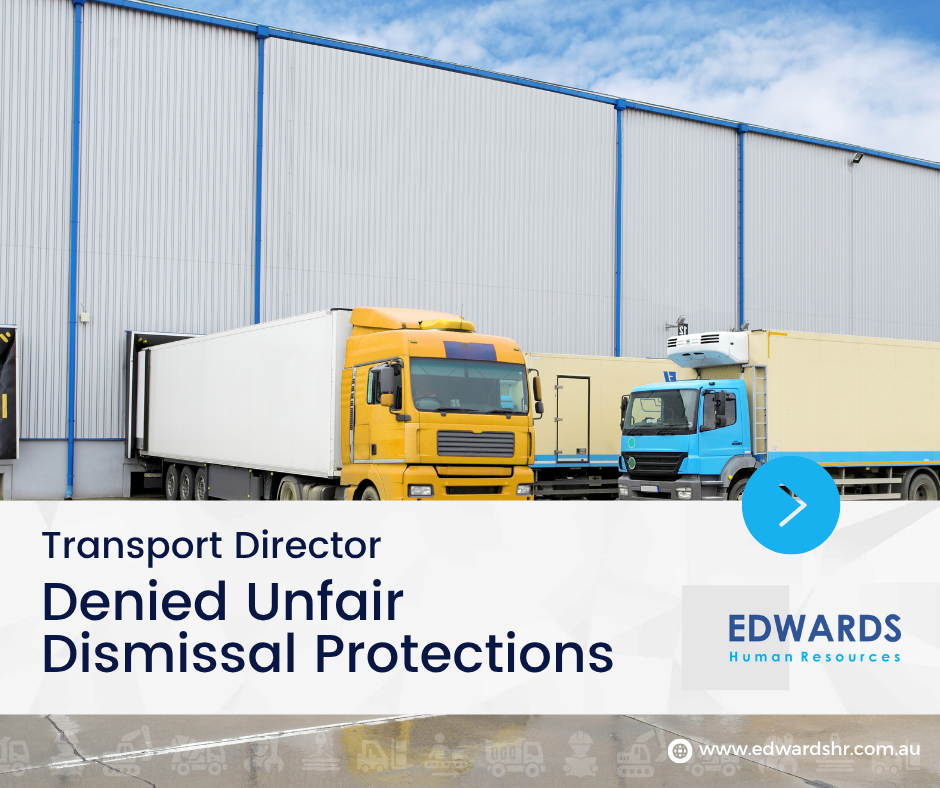- Published
The Fair Work Commission has made its first ruling under new laws letting regulated road transport contractors challenge unfair terminations. The recent case highlights an important distinction for transport operators and business owners.
Even if your company works under a contract for services, unfair termination protections apply only to individuals personally performing the work under that contract.
In this case, Maxma – a small transport business had a verbal agreement with SAL to provide daily courier services. While the contract was between Maxma and SAL, the sole director of Maxma lodged a personal claim for unfair termination as a regulated road transport contractor.
At the start of the contract, Maxma’s director personally handled deliveries.
But within weeks, he delegated most delivery work to their own drivers and shifted his focus to managing the contract, coordinating drivers, and occasionally driving himself for about 10-15 hours per month.
Each day, Maxma’s drivers collected paperwork from SAL and completed deliveries, typically working about 30 to 32.5 hours per week. The director’s management role, while operationally important, took only a few hours weekly.
When SAL ended the contract, the director claimed it was an unfair termination under the relatively new protections.
However, the FWC ruled that to qualify as a regulated road transport contractor, an individual must perform all or a significant majority of the work themselves under the contract.
Since the director was not personally performing most of the delivery work, his claim was rejected. The Commission clarified that it’s not enough to manage or oversee the contract, you must be physically doing the majority of the contracted work to be covered.
What this means for transport directors and operators
This case is a reminder that unfair termination protections as a regulated road transport contractor apply to the individual performing the work, not necessarily the business owner or director.
Many small and family-run businesses start with owners doing the work themselves but later transition to management roles. While this makes operational sense, it can leave directors without personal legal protections if contracts end.
If your role has shifted away from hands-on work, consider:
- Whether you’re still personally doing the bulk of the work under your contracts
- Whether your legal and business arrangements reflect the reality of how work is performed
- How your workforce structure impacts your rights under the Fair Work Act 2009.
If your company engages contractors who fit the definition of a ‘regulated worker’, be sure to seek advice prior to changing or cancelling these arrangements, and ensure you have a comprehensive Contracted Services Agreement in place. Contact our team to get this set up.
How we can help
As HR consultants specialising in transport and heavy industry, we help businesses review contractor arrangements, workforce structure, and compliance to reduce risk and protect your operations.
If you’re unsure how changes in your business affect your position, get in touch today.
We support businesses by:
- Preparing Contracted Services Agreements, specific to your circumstances;
- Reviewing contracts and job roles to ensure they match the work being done;
- Reviewing employee and contractor arrangements;
- Advising on workforce structure to keep you compliant and minimise risk;
- Helping you stay up to date with labour laws that affect your business;
- Providing training to keep your team informed and prepared.
Get in touch with our team today to discuss how we can help.
Stay up to date with all the upcoming changes via our Linkedin or sign up to our ‘Employer Update’ newsletter.



